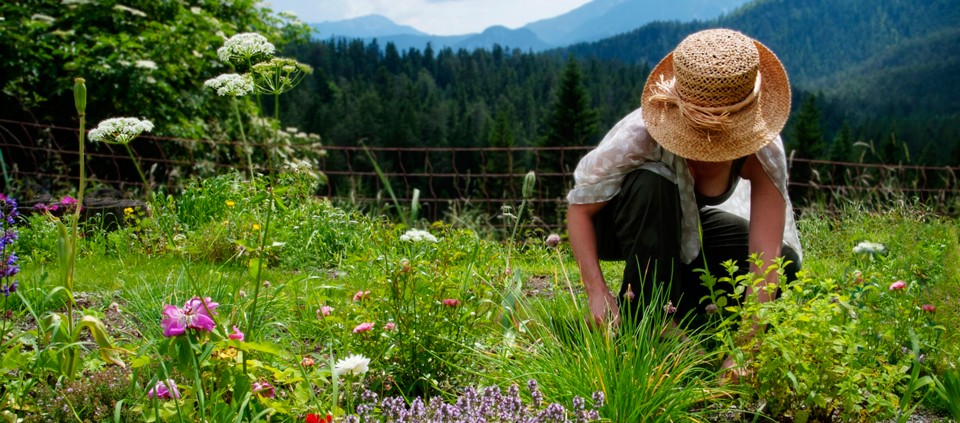Alleviating Anxiety with Gardening

by Janet Arnold-Grych
For many of us, the joy of gardening provides a gentle recalibration. Whether done on a large plot or in a simple pot, gardening beckons directed attention and voices no demands. The sensory experience it provides brings us into the present moment, and nurturing the budding plants fosters relaxation. While these benefits impact us all, they can be even more important for those who suffer from anxiety.
We all feel anxious from time to time. When worry and fear take up residence, however, they can become disruptive, even debilitating. I recall a colleague who was bright and kind and distractingly anxious about doing a good job. Reassurances had little impact and, on more than one occasion, I wished I could help her by opening some door and directing the anxiety to “Leave right now!”
According to the American Psychological Association, anxiety is linked not only to worry and unease, but also to physical effects, such as fatigue, restlessness, and muscle tension. And it’s one of the most common mental-health issues for Americans. The National Institute of Mental Health reports that nearly one-fifth of all Americans grapple with some form of anxiety disorder, and women are 60 percent more likely to experience anxiety in some form over their lifetimes. Since stress can exacerbate the symptoms of anxiety, finding ways to alleviate or manage stress can be critically important to managing anxiety.
One means of management can be getting your hands in the dirt. Many studies tout the benefits of gardening and green space on mental health. In the March 2017 issue of Preventative Medicine Reports, researchers in Japan and the United Kingdom shared their review of 22 case studies (many of them from the US) on gardening and health. The synthesized information clearly reinforced the positive impact of gardening, including on symptoms of anxiety and stress. The researchers suggest a few reasons for this, including the speculation that a “direct experience with nature restores attention and reduces fatigue.”
That feeling of restoration is palpable. “I feel connected to the earth and sky when I am gardening,” says Vandita Kate Marchesiello, Kripalu Yoga teacher, Kripalu faculty member, and avid gardener. “The sunshine or a light mist of rain feels so wonderful on my skin. I enjoy the smell of the dirt and the plants that I’m working with. Since I work indoors most of the time, I look forward to being outside in the fresh air.”
The exact mechanism through which gardening decreases anxiety may be unclear from a research perspective, but it seems that the amalgam of mindfulness, beauty, and physiological “down-regulation” (since the nervous system “quiets down”) provides a sense of control and calm that can have lasting effects.
Gardening in and of itself can be healing, but when you raise flowers or herbs that offer calming benefits when ingested, that’s a double bonus. (Of course, always check with an herbalist or other wellness professional before ingesting medicinal herbs, especially if you’re pregnant, nursing, or taking medications.) Along with the wonderful standbys you might be familiar with—like lavender and chamomile—try growing and enjoying these soothing plants.
Lemon Balm: A relative of the mint family, lemon balm is well known to herbalists and Ayurvedic practitioners and can address a long list of ailments. This lemon-scented plant can grow up to two feet, delivering a burst of leafy green. Make tea with a handful of fresh or dried leaves.
Passionflower: Passionflowers look delightfully exotic, with spindles of purple amid white or purple leaves emanating from its disc. Some variants can grow vines up to 30 feet in length. The dried leaves can be made into a tea that offers calming benefits.
Holy Basil (Tulsi): This form of basil is purported to support the body’s own defense mechanisms, as well as providing calming effects. The plant develops cone-like structures with tiny purple flowers atop its green leaves. Throw fresh tulsi leaves in your salad, use them to make pesto, or brew a cup of tea.
Motherwort: Growing up to five feet tall, this hardy and whimsical plant, a member of the mint family, delivers green leaves interspersed with tiny buds of purple and white. Because of its bitter taste, it’s more frequently used as a tincture rather than a tea. In addition to offering calming effects, it is said to be helpful for heart conditions and intestinal upset.
The alignment we cultivate with nature brings us into closer alignment with our true nature. So whether we look to nurture lemon balm, lavender, pansies, or peas, tending our plants with joy and presence can decrease anxiety and increase well-being. And it is in that connection that we more fully bloom.
Janet Arnold-Grych is a yoga teacher and writer whose work has been published in Elephant Journal, Huffington Post, Third Coast Digest, and other outlets.